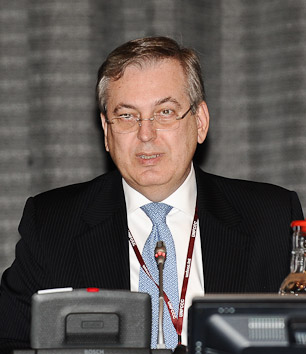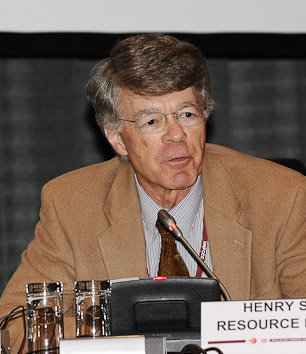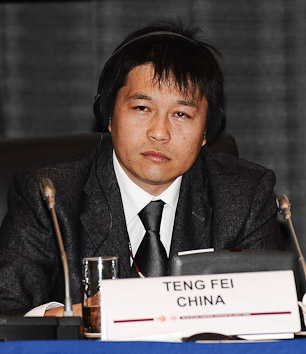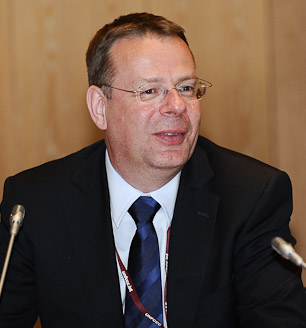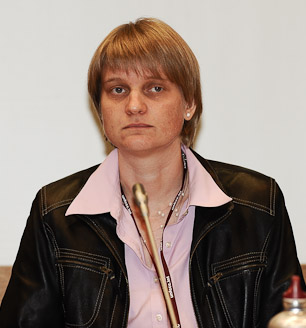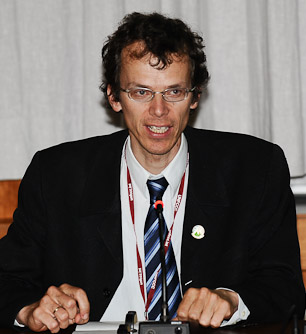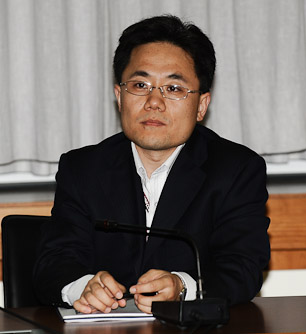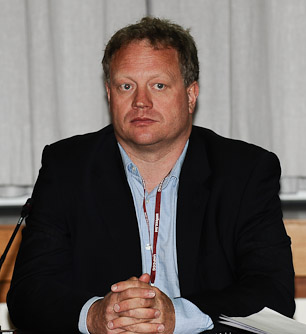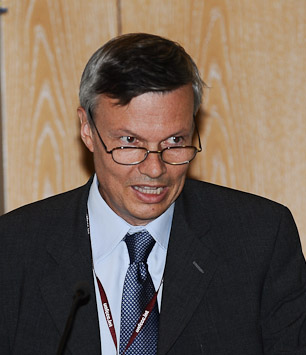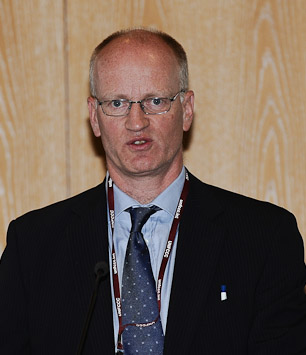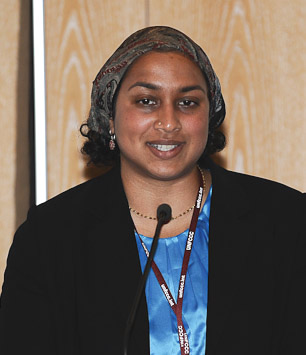 |
A Special Report on Selected Side Events at the 1-12 June 2009 Bonn, Germany |
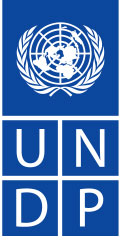 |
| Daily Web Coverage and Reports | ||||||||||||||||||||||||
| 1 June | 2 June | 3 June | 4 June | 5 June | 6 June | 8 June | 9 June | 10 June | 11 June | 12 June | ||||||||||||||
| HTML | ||||||||||||||||||||||||
Events on Thursday, 4 June 2009
Technical Briefing by the AWG-LCA Chair on Historical Responsibility as a Guide to Future Action to Address Climate Change
Organized by the AWG-LCA Chair
This technical briefing, chaired by AWG-LCA Vice-Chair Luiz Machado, was added to the programme in response to a request by some parties for a further opportunity to discuss the concept of historical responsibility in order to guide future action to address climate change.
Henry Shue, University of Oxford, noted two common objections to the concept of historical responsibility: it creates an ex post facto “crime” since the problem was largely produced by previous generations; and there is actually no “crime” because previous generations were not aware of the dangers of the GHG emissions they produced. He stressed that while lack of knowledge may lessen historical responsibility, it does not negate it altogether.
Martin Khor, South Centre, cited carbon budgeting and negative emissions as two possible approaches for addressing historical responsibility. He highlighted underlying concepts, including rights to atmospheric and development "space." Khor stressed that the biggest challenge for Copenhagen and beyond is determining how to distribute tasks between Annex I and non-Annex I countries in a fair manner that reflects: common but differentiated responsibilities; historical responsibility; and the need for development. He stressed that this is not simply a task of translating scientific facts into political goals.
Laila Gohar, Hadley Centre, summarized the results of the Ad Hoc Group for the Modeling and Assessment of Contributions to Climate Change (MATCH), which seeks to scientifically assess the potential to set differentiated emission reduction targets for Parties according to the impact of their historical emissions on temperature rise. She highlighted outputs, including historical country-level data sets stretching back to the 18th century and online simulation models. Gohar stressed the importance of choosing start dates and dealing with uncertainty in historical emissions.
Amb. Angelica Navarro, Bolivia, discussed the concept of climate debt as a fair and equitable way to address climate change that builds on science and reflects Convention principles. She said climate debt is a holistic solution that addresses both mitigation and adaptation, and stressed that those who have become wealthy by causing climate change should compensate those who are poor and suffer its impacts most.
José Miguez, Brazil, stressed the importance of historical responsibility. He highlighted the importance of GHG residence time, explaining that even if emissions are reduced now, atmospheric concentrations as well as temperatures will continue to increase. Further stressing the importance of the polluter pays principle, he said “forgetting the past gives an extra burden to developing countries.”
Prodipto Ghosh, India, stressed that historical and differentiated responsibilities are inseparable. He highlighted the importance of considering ethical dimensions, including the need to undo harm and prevent future damage to innocent people. Ghosh underscored that Annex I parties have positive historical differentiated responsibilities and non-Annex I have negative responsibilities.
Participants discussed, inter alia: the need to quantify historical responsibility; the lack of data for all gases and sources, which could bias modeling results; whether one single metric can capture one country’s full historical responsibility; the potential role of developing country mitigation as a “poverty trap”; the importance of considering capabilities in addition to responsibilities; whether lack of knowledge about the effects of one’s actions has implications for quantifying responsibility; how to envisage the maximum permissible global mean temperature; and the idea that “today’s emissions are tomorrow’s historical responsibility.”
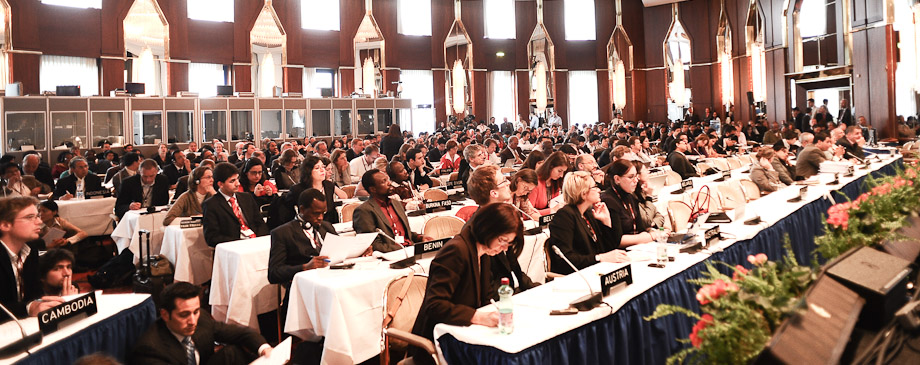 |
| Participants attended the side event. |
 |
Henry Shue, University of Oxford; Martin Khor, South Centre; Laila Gohar, Hadley Centre; Florin Vladu, UNFCCC; AWG-LCA Vice-Chair Luiz Machado, Secretariat; Amb. Angelica Navarro, Bolivia; José Miguez, Brazil; Fei Teng, China; and Prodipto Ghosh, India |
|
|
The Role of Geological Surveys in CCS Regulation
Presented by Germany
This event examined storage, monitoring, and transport infrastructure aspects of carbon capture and storage (CCS) in Germany.
Stefan Knopf, Federal Institute for Geosciences and Natural Resources (BGR), Germany, described the development of a “storage catalogue” that will identify potential geological CO2 sinks and their storage capacities in Germany. Noting the importance of this information for implementing large-scale CO2 storage, he explained that the catalogue will be publicly available upon completion. He said it will contain distribution maps, classification information on potential reservoirs and barrier rocks, and characterization data on potential storage structures.
Frauke Schaefer, BGR, described how models can be used to predict the behavior of stored CO2 over time. Noting that models will never perfectly predict CO2 movement and changes in pressures, she emphasized the importance of fine tuning the models by comparing simulations to real data, such that continued use of the storage site is constantly steered by the best possible information.
Franz May, BGR, said monitoring has three purposes, namely to: control operation and performance; ensure health, safety and environmental protection; and account for carbon credits. He said contemporary monitoring tools can fulfill the first two purposes but cannot presently fulfill the role of accounting for carbon credits.
Felix Matthes, Institute for Applied Ecology, Germany, stressed that CO2 transport is a critical yet poorly discussed aspect of CCS. Noting that development of a 300km pipeline in Germany could cost €500 million and involve 1000 cases of land expropriation, he stressed that significant lead times and close linkages to emerging information on storage sites and capacities are required to prevent delays on CCS implementation.
Participants discussed, inter alia: location of CCS sites relative to CO2 sources; the use of CCS for carbon sources other than coal; and the need for public consultation in CCS research and development.
 |
L-R: Felix Matthes, Institute for Applied Ecology, Germany; Franz May, BGR; Gabriela von Goerne, BGR; Frauke Schaefer, BGR; and Stefan Knopf, BGR |
|
|
The Reform of the CDM and Sectoral Mechanisms
Presented by ClimateNet
This panel discussed the current reform options under the CDM and design options for sectoral approaches.
Kristian Tangen, Point Carbon, Norway, discussed the potential role of sectoral approaches in a post-2012 framework. He noted critiques of the CDM, such as high transaction costs and leakage issues, as well as successes, such as the “unprecedented” amount of emission reductions created and the CDM’s ability to mobilize private resources. He highlighted that it will be very difficult to address certain sectors, such as agriculture and deforestation, through the CDM.
Tangen then noted various advantages and disadvantages of sectoral approaches. He suggested that “no-lose” approaches provide the government with leeway but could be an excuse to “do nothing,” and that data requirements could hamper implementation. On no-lose targets for installations, he highlighted that this approach is easy to implement in a step-wise fashion, making data availability less problematic, but is inefficient for some sectors, such as transport. He concluded that a cost-effective approach should, inter alia: be tailor-made for each country; continue to use the CDM or a similar project-based approach for certain sectors; and facilitate no-lose targets for installations.
Duan Maosheng, Tsinghua University, China, outlined the four major proposals for sectoral approaches based on: absolute targets; energy intensity; policy and measures; and technology standards. He evaluated the potential to apply each of these approaches in China’s iron and steel sectors, noting that his assessment criteria include evaluation of, inter alia: additionality; verifiability; transaction costs and cost distributions; and linkages with the current system. He concluded that: a technology-based approach is a good starting point; a dual system that combines project- and technology-based approaches may be a future option; and capacity building and further scaling up are important.
Axel Michaelowa, University of Zurich, reported the results of a recently concluded research project that aims to build trust among key “advanced developing countries,” with a focus on China, India and some African countries. He said the project evaluated project-, performance-, programmatic-, and sectoral-based CDM approaches, and found, inter alia, that while performance-based CDM “exceeded all expectations” there are still key challenges, such as time lags.
Highlighting various challenges from the Indian industry experience, including the lengthy approval process and stringent additionality requirements, Michaelowa suggested improvements, such as allowing project developers to interact directly with the CDM Executive Board and developing country-specific benchmarks. He detailed incentives for including LDCs in the CDM, including discounting certified emission reductions depending on the level of development, project development, providing subsidies and enabling preferential access to buyers’ markets.
A participant from the EU delegation clarified that the role of no-lose targets is to enhance coverage of the global carbon market and improve environmental integrity.
Participants then discussed: how no-lose targets can address limited global coverage issues associated with the CDM; whether poor data quality is more significant for sectoral- or project-based approaches; problems with double counting when CDM and sectoral approaches run simultaneously; and whether CDM should be phased out in those sectors where sectoral approaches are introduced.
|
|
Forging an EU-US Alliance: What Does a Comparable Effort in a Global Carbon Market Mean?
Presented by the Foundation for Strategic Environmental Research (MISTRA)
This event addressed US and EU initiatives on emissions trading, and the connection between sectoral crediting mechanisms (SCMs) and carbon markets.
Bo Kjellén, Stockholm Environment Institute, opened the session, introduced the topics, and highlighted the European Climate Platform, an initiative by MISTRA.
Anders Turesson, Sweden, stressed the importance of: genuine US and EU involvement in the international climate regime; cooperation and dialogues between the US and EU; science-based policy; the use of available technologies and development of new ones; establishing a price on emissions; establishing carbon markets; and emissions trading.
Lars Zetterberg, Swedish Environmental Research Institute, spoke on the role of offsets from a EU perspective. He stressed that: sectoral approaches can establish a carbon price in developing countries and create incentives for emission reductions; emission targets set too low will create hot air; carbon prices set too low but with targets set too high will lead to high offset prices, few offsets and therefore little incentive for action; and that industry in Sweden opposes SCMs because they perceive that SCMs pay competitors to become more carbon-efficient.
Four discussants then offered comments. Shalini Vajhala, Resources for the Future (RFF), US, emphasized the importance of building trust between the EU and US and securing institutional pre-requisites for establishing the crediting mechanisms.
Jake Schmidt, Natural Resources Defense Council (NRDC), noted similarities between US and EU plans and said there are plentiful opportunities for collaboration. He stated that according to current US plans: countries selling offsets to the US would have to be participants in an international agreement or have bilateral agreements with the US; international offsets must meet domestic sets of rules; and eligible offset categories would include sectoral and deforestation credits.
Diana Movius, Center for Clean Air Policy (CCAP), elaborated on the US Waxman-Markey Bill currently under consideration in Congress. She said under the bill 5% of allowances should be set aside for REDD projects, and the US would credit only countries who demonstrate progress towards their own national baselines, thus providing incentives to developing countries to develop national policy programs.
Jürgen Lefevere, EC, said SCMs are gaining support and are construed as “stepping stones” towards a global carbon market. He said they would not replace CDM activities but assign different roles to them and require different policy frameworks. Lefevere recommended beginning with SCMs in well-developed economic sectors in “economically advanced” countries. On comparability of efforts, he said the EU would prefer not unilateral but multilateral development of an international framework that incorporates SCMs.
Participants discussed international investment implications of SCMs, and the importance of comparable allowance prices. One participant raised the issue of compatibility between sectoral crediting and notions of measurable, reportable and verifiable (MRV) actions and support agreed in Bali, noting that MRV was never intended to be tradable.
|
|
| Daily Web Coverage and Reports | ||||||||||||||||||||||||
| 1 June | 2 June | 3 June | 4 June | 5 June | 6 June | 8 June | 9 June | 10 June | 11 June | 12 June | ||||||||||||||
| HTML | ||||||||||||||||||||||||
Digimarc and the Digimarc logo are registered trademarks of Digimarc Corporation. The "Digimarc Digital Watermarking" Web Button is a trademark of Digimarc Corporation, used with permission.
Please e-mail the Digital Editor should you have any questions regarding the content of this page.
| Back to IISD RS "Linkages" home | Visit IISDnet | Send e-mail to ENB |
© 2009, IISD. All rights reserved.

